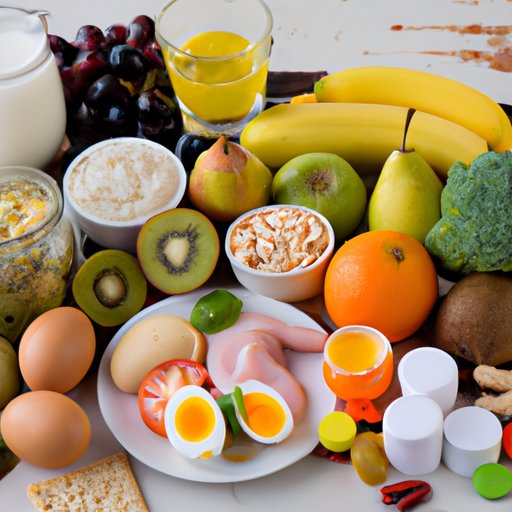Introduction
Pregnancy is an exciting time in a woman’s life. It is also a period when a woman needs to be extra mindful of her nutrition and lifestyle choices. Eating a nutritious diet during pregnancy is essential for the health of both mother and baby. Healthy eating during pregnancy can help reduce the risk of complications such as preterm labor, gestational diabetes, and birth defects.
Definition of Healthy Eating During Pregnancy
Healthy eating during pregnancy means consuming a variety of nutrient-dense foods that meet your individual needs. It is important to focus on whole grains, fruits, vegetables, lean proteins, healthy fats, and staying hydrated. Additionally, it is important to limit or avoid processed and sugary foods.
Overview of Benefits
Eating a healthy diet during pregnancy can provide numerous benefits for both the mother and baby. Some of the most notable benefits include:
- Increased energy levels
- Balanced hormones
- Reduced risk of birth defects
- Improved mood
- Reduced risk of gestational diabetes
- Healthier baby weight gain
Eat a Variety of Nutrient-Dense Foods
It is important to eat a variety of nutrient-dense foods during pregnancy. Eating a balanced diet will ensure you get all the necessary vitamins and minerals you need for a healthy pregnancy. Below are some of the most important food categories to incorporate into your diet:
Fruits and Vegetables
Fruits and vegetables are packed with essential vitamins, minerals, and antioxidants. They should be consumed daily in order to get the necessary nutrients needed for a healthy pregnancy. Aim to consume at least five servings of fruits and vegetables per day.
Grains
Whole grains provide the body with important vitamins, minerals, and fiber. Try to incorporate at least three servings of whole grains into your diet each day. Examples of whole grains include oats, quinoa, brown rice, barley, and millet.
Legumes
Legumes are a great source of plant-based protein and fiber. Try to incorporate at least two servings of legumes into your diet each day. Examples of legumes include beans, lentils, peas, and chickpeas.
Dairy Products
Dairy products are packed with important vitamins and minerals such as calcium, phosphorus, and vitamin D. Try to incorporate at least two servings of dairy products into your diet each day. Examples of dairy products include milk, yogurt, cheese, and cottage cheese.
Meat, Fish, and Alternatives
Meat, fish, and alternatives are a great source of protein. Try to incorporate at least two servings of meat, fish, and alternatives into your diet each day. Examples of meat, fish, and alternatives include lean meats, poultry, eggs, nuts, and nut butters.
Focus on Whole Grains, Fruits and Vegetables
Whole grains, fruits, and vegetables are key components of a healthy diet during pregnancy. Not only do they provide the body with important vitamins and minerals, but they are also high in fiber which can help keep you feeling full and satisfied.
Benefits of Whole Grains
Whole grains are an excellent source of complex carbohydrates, fiber, and B vitamins. They are also low in fat and calories. Eating whole grains can help keep blood sugar levels stable and provide long-lasting energy throughout the day.
Benefits of Fruits and Vegetables
Fruits and vegetables are packed with essential vitamins, minerals, and antioxidants. They are also low in fat and calories. Eating fruits and vegetables can help boost immunity, support digestion, and provide long-lasting energy.
Incorporate Lean Proteins
Protein is an essential nutrient during pregnancy. It helps build and repair tissues, produce hormones, and support the growth and development of the baby. It is important to consume lean proteins to ensure you are getting enough protein without consuming too much unhealthy fat.
Sources of Lean Protein
Some sources of lean protein include lean meats, poultry, fish, eggs, beans, lentils, nuts, and nut butters. Aim to consume at least two servings of protein each day.
How Much Protein is Needed?
The recommended amount of protein during pregnancy is 75 grams per day. This can be achieved by consuming two servings of lean protein per day.
Choose Healthy Fats
Fats are an essential part of a healthy diet during pregnancy. They provide the body with energy, help absorb vitamins, and support the growth and development of the baby. It is important to choose healthy fats such as monounsaturated and polyunsaturated fats over unhealthy saturated and trans fats.
Sources of Healthy Fats
Some sources of healthy fats include olive oil, avocados, nuts, and nut butters. Aim to consume at least two servings of healthy fats each day.
How Much Fat is Needed?
The recommended amount of fat during pregnancy is 70-100 grams per day. This can be achieved by consuming two servings of healthy fats per day.
Stay Hydrated
Staying hydrated is essential during pregnancy. Water helps keep the body functioning properly and can help prevent dehydration. Drinking plenty of water can also help reduce the risk of constipation and other digestive issues.
Benefits of Staying Hydrated
Staying hydrated can help reduce fatigue, headaches, and muscle cramps. It can also help promote a healthy pregnancy by providing the body with the fluids it needs.
How Much Water is Needed?
The recommended amount of water during pregnancy is 8-10 glasses per day. This can be achieved by drinking water throughout the day and avoiding caffeinated and sugary beverages.

Avoid Processed and Sugary Foods
Processed and sugary foods should be avoided during pregnancy. These foods are high in unhealthy fats, sugar, and sodium, and can increase the risk of obesity, diabetes, and heart disease. Eating these foods can also lead to weight gain and other health issues.
Risks of Eating Processed and Sugary Foods
Eating processed and sugary foods can lead to weight gain, increased risk of gestational diabetes, and other health issues. It can also cause blood sugar levels to spike, leading to fatigue and hunger.
Healthy Alternatives
Instead of processed and sugary foods, opt for healthier alternatives such as fresh fruits, vegetables, whole grains, and lean proteins. These foods are packed with essential vitamins, minerals, and other nutrients that will keep you and your baby healthy.

Speak to Your Doctor About Dietary Supplements
It is important to speak to your doctor about dietary supplements. Certain supplements may be necessary to ensure you are getting all the necessary vitamins and minerals needed for a healthy pregnancy.
Reasons for Taking Dietary Supplements
Common reasons for taking dietary supplements during pregnancy include insufficient intake of certain nutrients, increased nutritional demands, and medical conditions. Speak to your doctor about which supplements are right for you.
Types of Supplements to Consider
Some common types of supplements to consider during pregnancy include folic acid, iron, calcium, omega-3 fatty acids, and vitamin D. Speak to your doctor about which supplements are best for you and your baby.
Conclusion
Pregnancy is an exciting time in a woman’s life. Eating a nutritious diet during pregnancy is essential for the health of both mother and baby. This guide covers how to eat healthy during pregnancy, from incorporating nutrient-dense foods to avoiding processed and sugary foods.
Summary of Key Points
- Eat a variety of nutrient-dense foods including fruits, vegetables, whole grains, legumes, dairy products, and lean proteins.
- Focus on whole grains, fruits, and vegetables for added nutrition.
- Choose healthy fats such as monounsaturated and polyunsaturated fats.
- Stay hydrated by drinking 8-10 glasses of water per day.
- Avoid processed and sugary foods.
- Speak to your doctor about dietary supplements.
Final Thoughts
Eating a healthy diet during pregnancy is essential for the health of both mother and baby. Incorporating a variety of nutrient-dense foods, focusing on whole grains, fruits, and vegetables, choosing healthy fats, staying hydrated, and avoiding processed and sugary foods can help ensure a healthy and safe pregnancy.
(Note: Is this article not meeting your expectations? Do you have knowledge or insights to share? Unlock new opportunities and expand your reach by joining our authors team. Click Registration to join us and share your expertise with our readers.)
